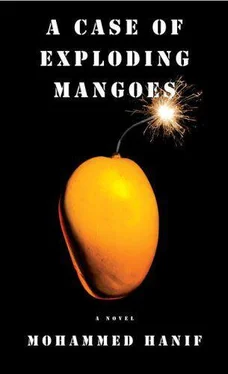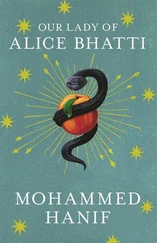Brigadier TM’s boys were recruited from remote villages and trained so strenuously that by the time they finished their training — if they finished at all, as more than two-thirds begged to be returned to their villages — they had a vacant look on their faces. Unquestioning obedience was drilled into them by making them dig holes in the earth all day only to fill other holes the following day. They were kept away from civilians for so long that they considered anyone in civvies a legitimate target. General Zia spread his hands in exasperation and waited for TM to say something more.
“These are my procedures,” Brigadier TM said, getting up, “and they seem to have worked so far. If you’ll allow me, we can bring back the K-9 Platoon.”
General Zia noticed with satisfaction that he hadn’t used the word ‘guard dogs’.
“Why do we need those filthy dogs? Are they better than your commandos?”
Brigadier TM put his hands behind his back, looked above Zia’s head and gave the longest speech of his career. “We have got air cover. We cover all the access points to the Army House. We monitor all movements within a five-mile radius. But what if someone outside that radius is digging a tunnel right now, long and deep, which leads up to your bedroom? We have got no underground cover.”
“I have cancelled all my public engagements,” said General Zia. “I won’t go to the President’s House even for state functions.”
And suddenly Brigadier TM felt like a civilian. Too slow to understand the obvious, to see what stared him in the face. The carpets, the curtains and the sofas were from the newly built President’s House. He still couldn’t figure out where he had seen the portrait.
“I am not leaving the Army House until you find out who it is. Go through General Akhtar’s files. Major Kiyani has got a suspect, talk to him.”
“I need a day off, sir,” Brigadier TM said, coming to attention.
General Zia had to muster all his self-control to remain calm. Here he was, worrying about all these threats to his life, and his Security Chief wanted to get away for some rest and recreation.
“I am leading the para jump at the National Day Parade, sir,” Brigadier TM explained.
“I was thinking of cancelling the parade,” General Zia said. “But General Akhtar keeps insisting we can’t have a National Day without the National Day Parade, so I am thinking of cutting down on the ceremonies. We won’t have the post-parade mingling with the people. But you can do your jumps if you want. I am not going to the Academy either. They were planning some kind of silent drill display. Do you know what that is?”
Brigadier TM shrugged his shoulders and his eyes scanned the room one last time.
Before leaving the room Brigadier TM didn’t forget to point out the security breach. “Sir, if you want anything transported from President’s House, do let me know and I’ll arrange the security clearance.”
General Zia, still thinking about the tunnel under his bedroom, threw his hands in the air and said, “The First Lady. I don’t know what that woman wants. You try talking to her.”
Istay still in the bed, eyes shut as I listen. Someone is moaning in the adjoining room. I can hear the faint sound of the Academy band practising a slow march. Every sound is filtered, muted; the light seems to be fading away. This is just like the afternoons I remember at our house on Shigri Hill, where a bright puddle of light on a mountain peak tricks you into believing that there is still a lot of daylight left. One moment the sun is a juicy orange dangling low on the horizon and the highest mountains are awash in bright sunlight. The next moment the only light is a flicker from a fire on a distant peak. Night on the mountains is a black sheet flung from the skies. The day packs up and leaves without giving anyone any notice, without any formal goodbyes.
Just like Baby O.
I try to banish the mountain dusk from my mind and focus on my current plight. There is sadness about the lost day, but there is a phone on the other side of the curtain and Obaid is not the kind of person to scrawl numbers on his favourite hankie if they don’t mean anything.
I open my eyes and see the silhouette of the duty nurse bent over a newspaper on the other side of the curtain. I let out a slow moan to see if he is alert. He lifts his head from the paper, looks vaguely towards me, then gets busy with his newspaper again.
In his yogi phase Obaid claimed that if you meditated regularly you could will people to do things — small things usually. If you stare at a stranger’s neck long enough he is bound to turn and look towards you. Obaid had demonstrated it a number of times. The success is random at best, and making them move from point A to B is an altogether bigger challenge. I don’t have much experience, but I stare and stare, and after about half a century, the nurse gets up and leaves.
I can’t be sure whether he has gone for his prayers or for an early dinner. Maybe his shift has ended. All I know is that this is my only window of opportunity.
As my limbs go into action, everything happens very fast; shirt, boots, belt, sword, cap find their place on my body like rifle parts coming together in the hands of an experienced soldier. The tone on the telephone is loud and clear and I start dialling the number urgently, as if Obaid is going to pick up the phone at the other end.
As I am dialling the last two digits my nose catches the faint smell of Dunhill. My first thought is that some cheeky bugger is smoking in the sickbay. My morale gets a boost with the thought that I can probably get a cigarette off him after I finish the phone call.
The phone is answered on the second ring. The operator, used to receiving too many calls, replies in a neutral tone; he will only decide what to do with me after he can identify my rank, and can establish my status in the scheme of things.
“ Asslam u alaikum , Army House,” the operator says, and the shock of being connected to that place is mixed with relief that the operator seems to be a civilian. It’s usually easy to impress them.
“Khan sahib,” I start. “I’m a relative of General Zia. I know you can’t put me through to him, but can you take an urgent message?”
“Your name, sir?”
“Under Officer Ali Shigri. Son of Colonel Quli Shigri. The late Colonel Shigri.” I always find this the hard part, but the name works and I suddenly feel I am being listened to. Not that he actually believes that I am related to the General, but he has obviously heard of Colonel Shigri. Who in the Army House doesn’t know the late Colonel Shigri?
“Do you have a pen and paper?”
“Yes, sir.”
“Write: Colonel Quli Shigri’s son called. He gives his respects. He gives his salaam. Did you get that? Salaam.”
“Yes, sir.”
“He says that he wants to pass on some very important, very urgent information about the missing plane. It’s a matter…did you get that?”
He replies in the affirmative and I think hard about an attention-grabbing end to my message: My only friend in the world is in danger. If you guys have him, be nice to him. I have some top CIA info that I can’t trust anyone with. Save my ass .
“It’s a matter of national security,” I say. “He must get this directly from you.”
I smell the Dunhill smoke in the room before I hear the voice. I would recognise it from my coffin.
“Under Officer Ali?”
The fact that the voice has used my first name makes me put the phone down abruptly.
Major Kiyani of the Inter Services Intelligence is standing in the doorway, one hand leaning on the frame, the other holding the cigarette in front of his chest. He is in civvies. He is always in civvies. A cream-coloured silk shalwar qameez, neatly pressed, his gelled hair glistening under the bulb’s light, a curl carefully arranged in the middle of his forehead where his burly eyebrows meet.
Читать дальше












